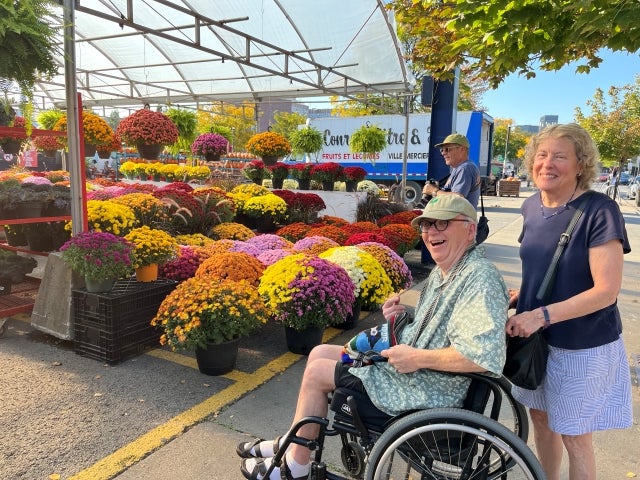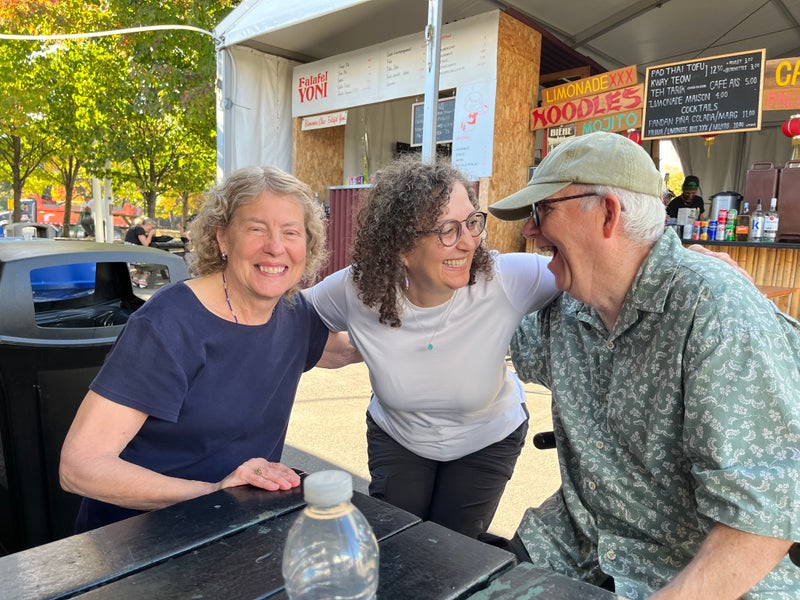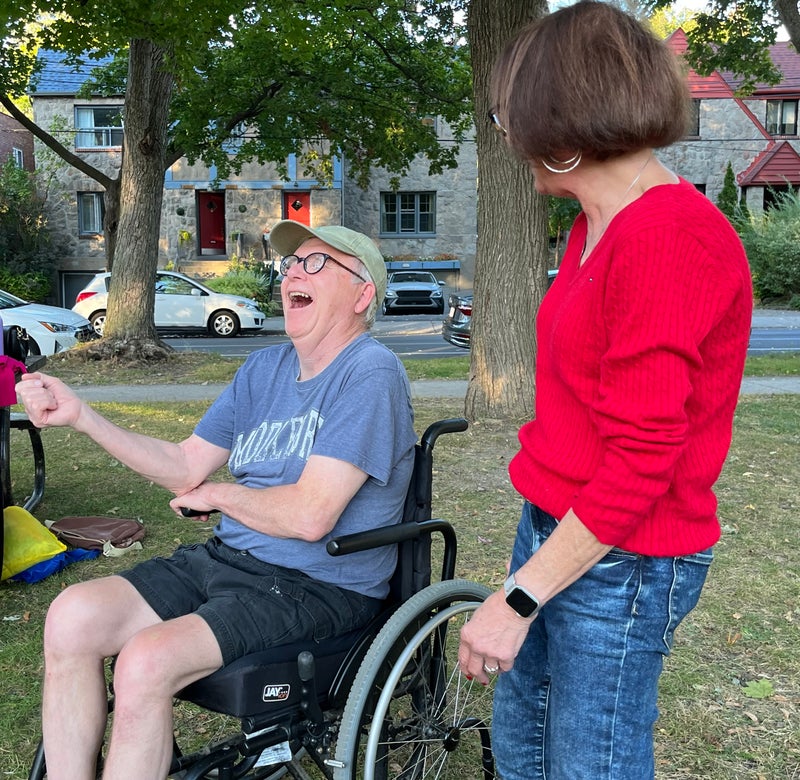The right to accessibility is for all

When I leave my home, I do not think about my basic human right to enter and exit the places I visit or my ability to find a washroom that meets my needs. My friend Larry from Providence, Rhode Island cannot be so carefree. He navigates in a wheelchair and drives a van using hand controls. When he and his wife Lis came to Montreal last year, my priority, and ultimately my greatest challenge in planning their visit, was accessibility.
Larry and I met during the pandemic when he started attending my laughter club. We both run our own weekly sessions online where we share the joy and healing power of laughter with an international community. After the pandemic, I began to hold outdoor session in a local park with my Montreal group. Larry was anxious to join us and meet his newfound Canadian friends in person.
I had only a few weeks to prepare for their visit, which entailed finding accommodations and restaurants that were accessible, for example, without stairs and with wheelchair accessible washrooms and grab bars. I would also organize two outdoor laughter events, take the couple on a tour of local attractions and provide Montreal bagels. Out of my control was the fall foliage, which I hoped would peak by the time they arrived.
I initially wanted to host my American friends in my home. While our building is accessible, on a virtual tour, Larry hesitated. Our washroom has no rails. I bought some suction grab bars and even rented a portable toilet rail, but I was concerned about how safe they were. I cancelled the at-home dinner and began to search for accessible restaurants in west-end Montreal.
While at one of my favourite spots, I noticed that the bathroom was fully accessible. Bingo! Not so fast…as we left the restaurant, I noticed two stairs.
I asked the staff if they had a portable ramp. “No,” they replied. “How do people in wheelchairs get in and out?” I asked. “We used to have something, but it didn’t work. Someone can lift the chair up the stairs,” they suggested. In this case, it was not an option.
I subsequently walked up and down my neighbourhood streets in search of inclusive restaurants. I found many with an accessible entrance or an accessible washroom, but almost none that had both.
I polled two friends who use power chairs, asking them where they like to dine out. I was surprised that neither had a restaurant recommendation to share. I may have been starting to understand why.

Larry and I met during the pandemic when he started attending my laughter club.
I have worked in the special needs field for 15 years and consider myself aware of and sensitive to the barriers that people with differing abilities face. But I had not yet addressed accessibility head on.
I consulted OnRoule.org, a comprehensive Montreal-based website that lists accessible restaurants, lodging and more. Resources are either submitted to the site by volunteers or found during mapping events. Sadly, there were no resources listed in the west end. I asked website founder Catherine Blanchette-Dallaire if there are simply no accessible resources in the area or if no volunteers had assessed them yet. “Se faire connaître est et sera toujours le défi,” she responded.
I finally found one restaurant in NDG that had a fully accessible washroom and what appeared to be an accessible entrance, with a little bump that I was assured a wheelchair could roll over. Just to be sure, I followed up with a phone call to confirm. “Yes, a wheelchair can enter from the main entrance,” they said. “But if there’s a problem, you can use a side entrance.”
After a nice meal we did have trouble exiting the restaurant. Put yourself in Larry’s chair for a moment. Imagine the frustration or humiliation he may have felt when his wheelchair couldn’t exit the building and our group members lifted him over the bump. Thankfully, Larry has a terrific sense of humour, gets less flustered than I do and is not shy to ask for help. He can’t be. (By the way, that side entrance was not accessible to us that evening).
Larry and Lis explained that in the USA, restaurants can be given hefty fines if they do not comply with the Americans with Disabilities Act (ADA) standards, which were enacted in 1990. Here in Canada, Accessibility Standards Canada, which began in 2019, is developing accessibility standards for federally regulated entities and federal organizations. It is the hope that the standards, or recommendations, brought forward will be adopted across the entire country. Accessibility Standards Canada is aiming to contribute to the realization of a Canada without barrier on or before January 1, 2040.
Back to the visit. Our second dinner was at a fully accessible franchised restaurant. I realized that a big chain was a smart way to go. I have added this resource to the OnRoule database.
The park where I hold the laughter events also presented a challenge. I was thrilled to discover that it is fully accessible. That said, each week leading up to the visit, I checked the accessible washroom and more often than not, it was locked (other washrooms for the general public were open).
I sent an email to the borough administration and was led through the proper channels to request that the washroom be unlocked during the required hours. I was told I needed to do this three weeks in advance. I was grateful that they granted my request even though I was late, and I breathed a long sigh of relief when I entered the park on both days to find the washroom unlocked. Thank you, Ville de Montréal!
Paramount to the restaurants and park visits was a good night sleep. I called several hotels until I found what I thought was the perfect accommodation. “Yes, we do have an accessible room with roll-in shower and grab rails,” the receptionist told me. The hotel, part of an international chain, was built in the last few years. I didn’t ask any further questions. I assumed they would have used the principals of universal design for accessibility and met the ADA standards even though in Canada. For this reason, Larry and Lis did not question it either upon making their reservation.
After their first night, I met Larry, usually full of laughter in the hotel lobby, fuming. The washroom grab rails were attached in the wrong place, leaving them ineffective (the bathroom in the lobby, on the other hand, met ADA standards). He spoke with the hotel manager, explaining the discrepancy.

Larry enjoying the laughter club in the park.
I reached out to Linda Gauthier, Senior Consult and Administrator at Le RAPLIQ (Regroupement des activists pour l’inclusion au Québec), a pan-Quebec organization that advocates for people with disabilities and victims of discrimination, to hear her thoughts. She corroborated my findings. “Unless it’s a federal building, they are not obliged to be accessible,” she said.
Linda shared the video Accessibilité – un droit - Henri au restaurant, with me. Created in part by Le RAPLIQ and sponsored by L’Office des personnes handicapées du Québec, it shows Henri trying to use an accessible restroom in a restaurant. While apparently fully accessible, once he enters in his power chair, he is unable to close the door. The narrator ends the video stating: « En virtue de la Charte des droits et libertés de la personnes du Québec, toute personne a le droit de vivre dans la dignité sans discrimination. La Charte a préséance sur toutes les autres lois. L’accessibilité universelle, c’est une question de droit. »
Until we are faced with a situation, are educated about a need, or have a law to abide by, our awareness is naturally low. Because of this fact of human nature, I don’t believe restaurateurs or other Canadian businesses can be blamed for their venues’ lack of accessibility. There has been no pressure to be otherwise.
I wondered if it may not be too difficult or costly to make most restaurants in Montreal accessible, even small-scale mom and pop joints located in old buildings. Could it be as simple as purchasing a portable ramp, adding grab rails and installing them in accordance with ADA standards while we wait for regulations to be recommended in Canada?
According to Linda, it is not that easy. She navigates in a power chair that weighs hundreds of pounds. She claims that portable ramps are not sturdy enough and can be dangerous, especially if not measured accurately. But on a basic human rights level, she completely disagrees with this strategy. “If a restaurant has a portable ramp, each time you go you have to ask for it. Why do we have to ask if it’s our right? We will never accept that as a reasonable accommodation.”
Linda explained that retrofitting washrooms can be costly. While there are government grants that can be applied for, they do not cover all the costs. “We will never have a law unless people complain,” she said, explaining that Larry could have lodge a complaint against the hotel within six months of the incident, and Le RAPLIQ would be happy to help him.
In our diversity, equity and inclusion-centric world, let’s remember that access is our right. Let’s work together, speak out and break down barriers to accessibility, one venue at a time.
Have you had a positive experience with accessibility in the Greater Montreal and surrounding areas (Laval, South Shore, West Island)? If yes, we’d love to hear about it. Share it with us in the comments or email us at info@inspirationsnews.com. Together we can help each other find accessible restaurants, parks and other services.
Share your accessible location on OnRoule.org









